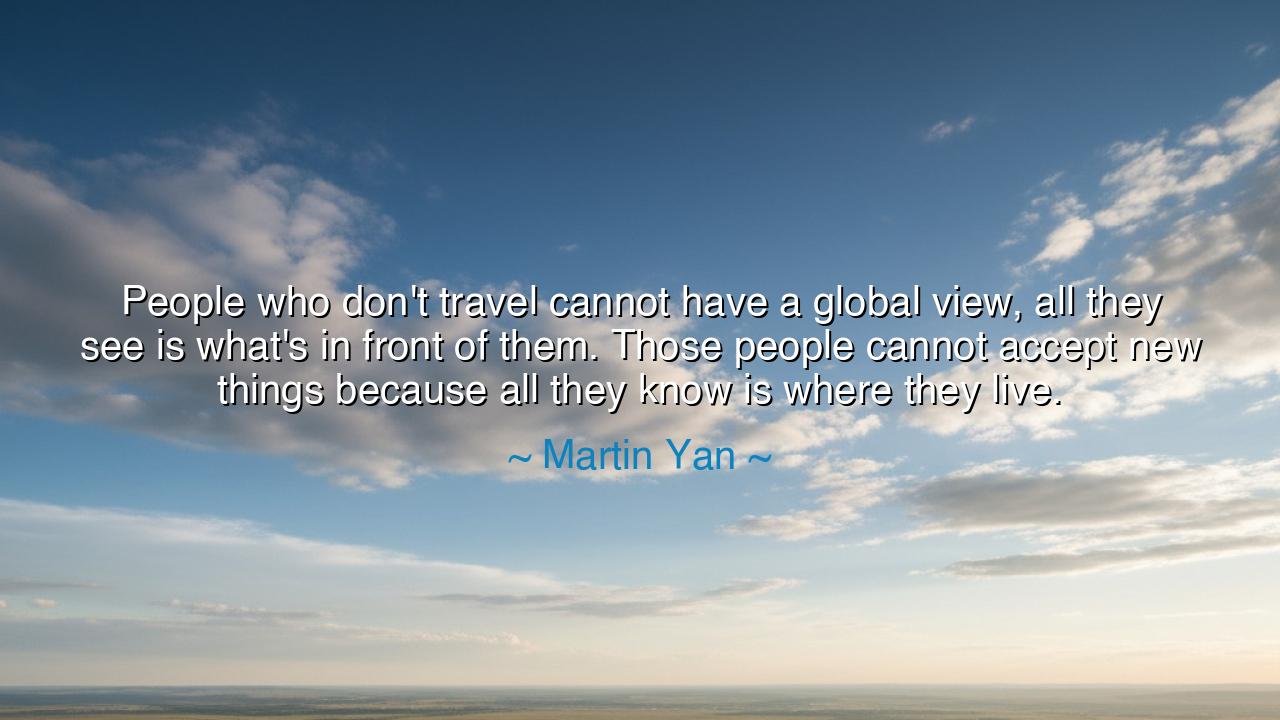
People who don't travel cannot have a global view, all they see
People who don't travel cannot have a global view, all they see is what's in front of them. Those people cannot accept new things because all they know is where they live.






Hear, O seeker of wisdom, the words of Martin Yan, who proclaimed: “People who don’t travel cannot have a global view, all they see is what’s in front of them. Those people cannot accept new things because all they know is where they live.” These words are not idle counsel, but a call to expand the mind, to break the chains of narrowness, and to step into the vast horizon of the world. For man who sees only his own street mistakes it for the entire earth; but the one who walks among many nations learns that truth wears countless faces.
The traveler does not merely cross mountains or oceans—he crosses the borders of his own understanding. To walk in another land is to encounter food, language, faith, and custom that may seem strange at first. Yet in these strangenesses, the eyes open. One begins to see that the world is not a mirror of oneself, but a vast mosaic where each piece is needed to complete the whole. This is the global view Martin Yan speaks of: the vision of a soul enlarged by the diversity of humanity.
The ancients also testified to this. Herodotus, called the Father of History, did not write from the comfort of his city. He traveled through Egypt, Persia, and beyond, gathering stories of many peoples. What might have seemed alien, he preserved as worthy of respect. Likewise, Ibn Battuta journeyed across Africa, Arabia, India, and China, and returned not only with tales of wealth and power but with wisdom of how different societies ordered their lives. Their greatness came not from remaining still, but from their willingness to meet the new without fear.
Consider, too, the opposite: the fate of those who never look beyond their own borders. In medieval Europe, many who never traveled imagined distant lands as monstrous and cursed. They could not accept new things, for their world was too small. When explorers finally brought back spices, silks, and maps, some rejected them as heresy, for their eyes had never been trained to see beyond what was familiar. The failure was not of the world, but of vision itself.
O listener, the lesson is clear: without travel—whether of body or of mind—one risks shrinking into ignorance. To move beyond what is in front of you is to learn humility, to see that your customs are not the only customs, your truths not the only truths. The global view teaches compassion, for it shows that the stranger is also a brother, and that wisdom may come from tongues and lands far from your own.
Practical action follows: if you can, travel across nations. Walk among their markets, taste their foods, listen to their music, and learn their histories. And if travel of body is not possible, then travel by mind: read books from other cultures, listen to the stories of immigrants, open yourself to the new. In every act of reaching outward, your soul grows wider.
Thus I say to you: heed the counsel of Martin Yan. Do not confine yourself to the narrowness of your street, your town, your single way of life. Seek the global view, for it is the view of the wise. To embrace the new is to embrace growth. And he who learns from many lands will return not merely as a traveler, but as a citizen of the world.






AAdministratorAdministrator
Welcome, honored guests. Please leave a comment, we will respond soon